[⚠ This is a draft, other version can be found here: http://www.incaseofpeace.org/conversation-starter/]
-
Science is not in papers.Science is a sport. It’s not something you put on a mantelpiece hoping people will eventually notice or cite, one day when you’re busy doing something else. If there is no-one keeping a thought alive, there is no thought. Yes, science is demanding: it requires thinking, not having thought.
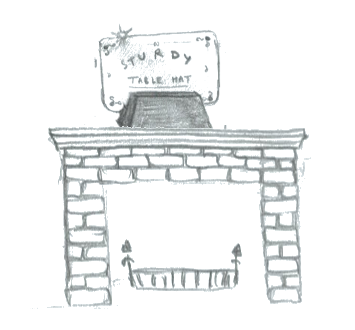 Trophy-science is not science. It’s an academic diversion and I bet there isn’t one academic scientist out there who’s unaware of that.
Trophy-science is not science. It’s an academic diversion and I bet there isn’t one academic scientist out there who’s unaware of that. -
Science is not done. No part of it ever is any time before it becomes obsolete. That’s not because we are never done explaining things better or discovering new things. It’s simply because we are never done changing perspectives, adapting what we say about the world to what we see of/in it. Said otherwise: the day we have communicated every meaningful thing and are satisfied with our communication of every meaningful thing – i.e. the day we’re out not only of new meaningful things to say but also of new meaningful ways of saying them, that‘s the day science is over, not before.
- Science is not true. Science is not finding nor even looking for the Truth. The Truth has no scientific existence. “The Truth” is not a scientific concept (except when Tarski takes a hold of it and deliberately makes it a scientific concept by explicitly giving it a formal framework, but then, it still isn’t The Truth, it’s
justTarski’s truth). What science is doing instead of the wild goose chase is actualising itself and adapting what humans can say about the world to the world as humans actually see it, so that they can best interact with it now.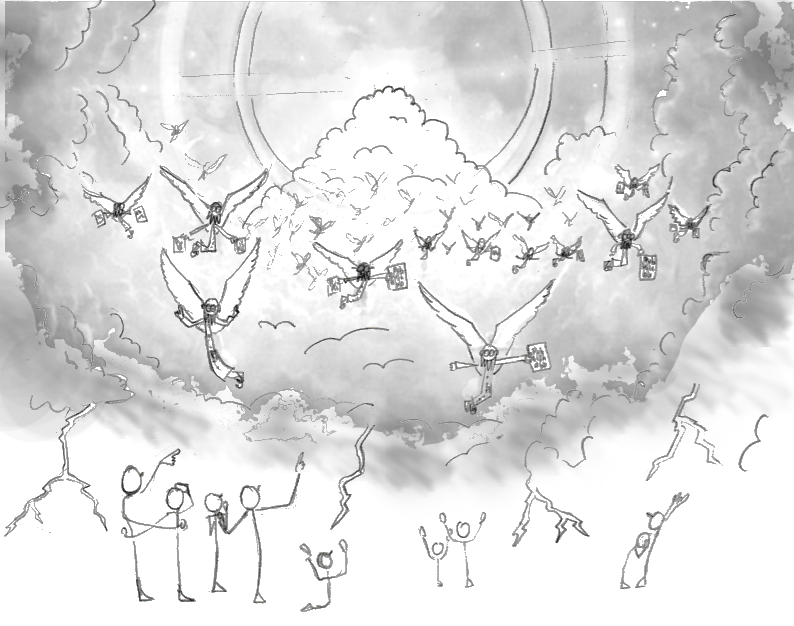 – – – more : – – – By the way, why do you think it’s only far out of the scientific spheres that you ever hear of things that are “scientific facts“? The answer is simple: scientific factuality is not a concept scientists ever need to use. One lesson that’s particularly easy to learn nowadays – and there’s no escaping it with word play – it’s that facts are unreliable. Science isn’t.
– – – more : – – – By the way, why do you think it’s only far out of the scientific spheres that you ever hear of things that are “scientific facts“? The answer is simple: scientific factuality is not a concept scientists ever need to use. One lesson that’s particularly easy to learn nowadays – and there’s no escaping it with word play – it’s that facts are unreliable. Science isn’t. -
Science is not objective. Given the way the words are usually thought of nowadays, it isn’t: if anything, it’s subjective. Indeed, science makes and deals with models. And what is a model precisely? the formalisation of a perspective someone has taken on something. There is nothing factual about the sense a model makes. It’s just the model’s definition that is. And since science cannot say anything about anything that isn’t a model, there we go: science is subjective, it informs on things seen from a particular well-formalised perspective.
-
Science is not about almost everything. That’s one of the greatest strengths and particularities of science. It can tell what it is not about because, by definition, what it is about, is formal, i.e. precisely: made to be what scientists can talk about.In different terms, any model (contrary to how and why it makes sense) is univocal by definition. That’s the whole point of the formalisation that produces the model: to have solid grounds on which to work, to have referential objects with well defined contours, to talk only of those, to not have to work with equivocal objects and notions that different people understand and see differently.So humans look at the things they care about, and science formalises the perspectives they take as they do so …
-
Science is not making progress. To say something is making progress you need a yardstick to compare things by. For instance to say that science is making better models than before requires
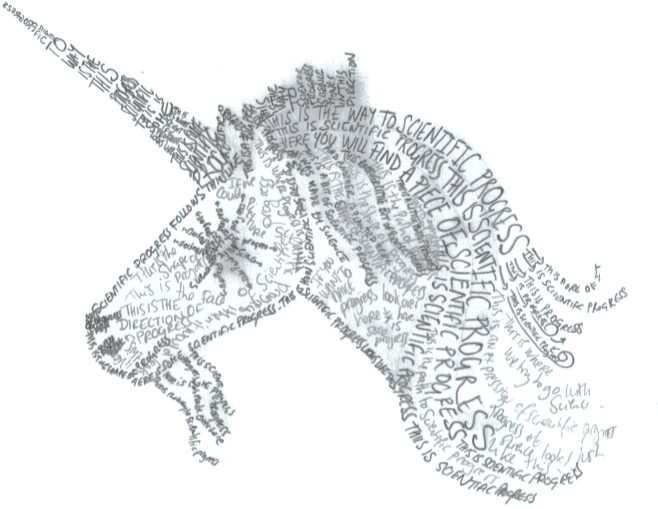 to explicit an actual (binary) relation between models. Say we have such a relation defined and we denote it “∠” so that if M and M’ are two different models, we write M∠M’ to signify that M’ is a better model than M. Well, to my knowledge, no-one has ever defined ∠. And even if they had, how could they possibly prove that ∠ is a better relation than say ∠-1? In terms of what? Anyone saying that science is making progress is just saying “Scientific models are currently a better fit to my pet idea of what reality is – being as I currently am, a 21st century inhabitant of the world those models are coming out of .” Scientists speaking as scientists don’t make such statements. They’re not scientific. Science can’t be scientifically (resp. meaningfully) gauged against something it is not (resp. against something it is moving away from), namely someone’s personal idea of what reality is right now. Please don’t say things like that, you wouldn’t be doing science any favours at all. On the contrary, you’d be actively contributing to obscuring what science is actually doing, concealing the real solid value it has behind some unnecessary fragile, disputable notions.
to explicit an actual (binary) relation between models. Say we have such a relation defined and we denote it “∠” so that if M and M’ are two different models, we write M∠M’ to signify that M’ is a better model than M. Well, to my knowledge, no-one has ever defined ∠. And even if they had, how could they possibly prove that ∠ is a better relation than say ∠-1? In terms of what? Anyone saying that science is making progress is just saying “Scientific models are currently a better fit to my pet idea of what reality is – being as I currently am, a 21st century inhabitant of the world those models are coming out of .” Scientists speaking as scientists don’t make such statements. They’re not scientific. Science can’t be scientifically (resp. meaningfully) gauged against something it is not (resp. against something it is moving away from), namely someone’s personal idea of what reality is right now. Please don’t say things like that, you wouldn’t be doing science any favours at all. On the contrary, you’d be actively contributing to obscuring what science is actually doing, concealing the real solid value it has behind some unnecessary fragile, disputable notions. -
Science is not realistic. Science is not concerned by realism, it’s concerned by relevance. This is important because realism doesn’t call for such a strict discipline of rigour as relevance does. To be relevant one must continuously call the model at hand into question and pay attention to the world outside of the model. To be realistic, it’s enough to shape the model casually according to one’s current pet idea of what reality is. Reality is diverse and multiple and personal. So whatever Reality is, it is neither the guide nor the yardstick of science. It is its inspiration and motivation though and that’s a lot! to-do: explicit the alternative yardstick (formal systems) → … no chicken and eggcf the little prince post (not ready yet though) cf "Perspectives and networks" on arxiv It suffice to agree that no model captures Everything to derive that it is impossible to prove that the properties of a model are properties of a real object as opposed to properties of the way we look at it, i.e. as opposed to properties of the model. Subtle differences in the way we look at an object can result in far from subtle differences in the ways to understand how it works. Under such conditions, since we only ever consider an object from a perspective (in other terms, since we never are god (assuming god is something who can simultaneously see absolutely Everything from absolutely Every point of view (assuming that even makes sense)), it makes no sense scientifically to be talking of real objects as opposed to models or perspectives, nor does it therefor make any sense to compare to one another models/perspectives in terms of anything that is not a model/perspective. More conundrum .
-
Science does not explain things. Scientists are not looking upstream for True Primal Causes to whatever they’ve decided deserves a True Primal Cause. It’s the other way around. Scientists are looking downstream for ways to tame effects that humans have noticed.– – – more : – – – ‘Science explains things’ is a clumsy musty relic from the times science was parleying with religion. Scientists at work know the idea is dysfunctional (when you ask, most of them will actually answer “Of course science isn’t explaining things, it’s just describing them.”, thereby sweeping further under the rug the question Why exactly do we need science for?).– – – more : – – – Scientists define black box concepts like “electricity” and “computation”. They don’t fill them up. They find contours for the black boxes that make the boxes actionable – i.e. such that they can effectively be used, possibly in combination with other black boxes, to impact on the world and/or to eventually inspire the definition of new black boxes and obsolete the old ones. What, essentially, are electricity and computation is irrelevant – and trivial by the way: “electricity” and “computation” are actionable concepts. They are the grips we’ve given ourselves to tame particular effects. (note that building computers didn’t take explaining how electrons in power cables succeed in producing the effect we coincidentally want them to produce).– – – more : – – – Science does not find answers. Answers, just like explanations, there are plenty of those already out there. Humanity never needed science and scientists for that (and let’s not even get started again on what qualifies as a “better” explanation or answer, the debate is old, we’ve got to get out of the Middle Ages now). Science looks for actionable questions.
-
Science is inconsistent. cf above : (i) a model = the formalisation of a perspective (NB: in the world, ∃ several perspectives ∧ #models>1 ) + (ii) science is not aiming at The Truth, it’s aiming at rendering a service.
 What is more, science thrives on inconsistency. (discussed below or somewhere else)
What is more, science thrives on inconsistency. (discussed below or somewhere else) -
Science is not to be trusted. (cf below)
-
Science is perfect. On the one hand there is the inspiration and motivation of science. That part is a matter of aesthetics, or sense – our ability to make science. It’s inconsistent and completely disputable but as long as it is, it’s perfect. On the other hand there are the inner workings of science. Science is practiced like a game with perfectly well defined rules. The rules of science are easy to apply (because the first of those rules says that when the other rules are not easy to apply then a framework in which they are must be defined by simply wording the difficulties encountered and setting them aside in the form of explicit postulates to be or not addressed later). Science is thereby not something you need to trust. If you feel either trust or mistrust about science, you probably don’t know the first thing about it (namely the rules of the game).
-
Science is not rational. Definitely not!! To say it is is to say just about the ugliest thing that can be said of it. Science is grounded on logic. Logic is almost the opposite of rationality. Rationality is group-thinking: starting from the same assumptions as other people you consider to be rational in order to get to conclusions that feel just as familiar to you as the premises you started from. Rationality is intricate and sly and intellectual. Logic is sensualAnalytic:= like a typical academic or encyclopedic article, technical research report or grant proposal, including the more graphic material presented in figures. Non-symbolic:= anything else that is just as accurate and complete, no more illustrative and metaphorical, but less linear, usually less verbal and more sensual. Typically, non-symbolic information is delivered through a sensual (visual, auditory,. . . ) experience. It expresses in a compressed form specific pieces of understanding, concepts or ideas that otherwise might need to be delivered by way of lengthy analytic descriptions. More and honest as hunger. It’s too simple to make sense otherwise than spontaneously.
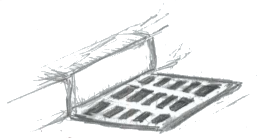 We don’t have to force it to (although we definitely do have to listen very carefully for it). That’s why science is indestructible. If it were rational, as a mathematician and a scientist aware of the natural beauty and power of logic, I would definitely encourage people’s contempt and mistrust for science.
We don’t have to force it to (although we definitely do have to listen very carefully for it). That’s why science is indestructible. If it were rational, as a mathematician and a scientist aware of the natural beauty and power of logic, I would definitely encourage people’s contempt and mistrust for science. -
Science is sensualAnalytic:= like a typical academic or encyclopedic article, technical research report or grant proposal, including the more graphic material presented in figures. Non-symbolic:= anything else that is just as accurate and complete, no more illustrative and metaphorical, but less linear, usually less verbal and more sensual. Typically, non-symbolic information is delivered through a sensual (visual, auditory,. . . ) experience. It expresses in a compressed form specific pieces of understanding, concepts or ideas that otherwise might need to be delivered by way of lengthy analytic descriptions. More. /sensuous and sensible
-
Science is communicable.
Popper botched the job, got only half of it done, possibly not even the most important half.Science works only with completely communicable objects – which is to say with completely communicated objects – which is to say with their communication itself.This is important because it is important to distinguish between (i) the central ‘objective’ part of science – the one played with well defined, easy to use rules manipulating purely formal objects (cf above), and (ii) the marginal, most delicate, subjective part of science that feeds completely communicated statements, questions and descriptions to the central part of science and draws sense out of its constructs. (formalisation + interpretation)Failing to appreciate the framework of the central part of science leads to neglecting the marginal part of science. Consequences are ineluctably serious: researchers are mislead, they bog down unnecessarily cultivating hollow Sudoku-science, and as time goes by uninterrupted by competent glimpses over the edge, approximate understandings of researchers worsen into veritable misunderstandings diffusing to the public.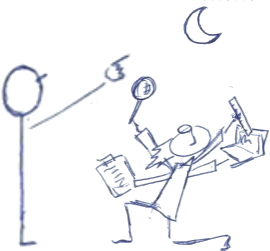
Formalisation (sense→form) and interpretation (formalisation-1) – those crucial steps of science-making that frame the part of science that Popper remembered the existence of – are absolutely essential to science in that without them, the things you can say about a model are very limited: as a member of the Academia Research club you can talk about your community’s historical take on the model, but as a scientist, there’s actually nothing for you to say. Whatever
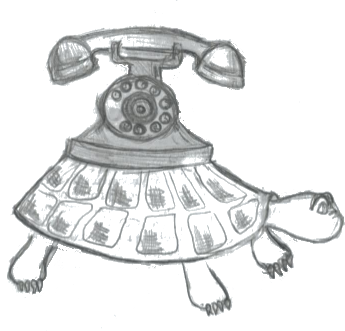 it is you’re studying, as a scientist, you can’t even tell that it isn’t about the effect of salt lamps on mental control under high voltage power lines.
it is you’re studying, as a scientist, you can’t even tell that it isn’t about the effect of salt lamps on mental control under high voltage power lines. 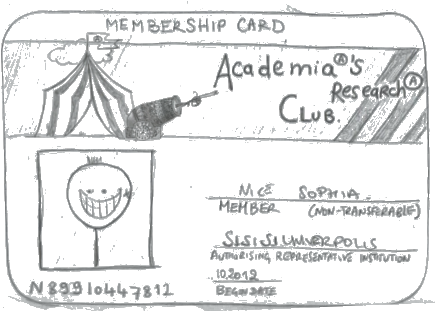 If you’re not in charge of the formalisation, you aren’t either of the interpretation. And if you manage to have a targeted effect on the world through your research, you owe a lot of it to the world’s cooperativeness (that same thing humans use to get by in life as non-scientists, which in research is often enhanced by the fact that you are the representative of a whole lineage of researchers which is bound to have an impact on the world at some point).
If you’re not in charge of the formalisation, you aren’t either of the interpretation. And if you manage to have a targeted effect on the world through your research, you owe a lot of it to the world’s cooperativeness (that same thing humans use to get by in life as non-scientists, which in research is often enhanced by the fact that you are the representative of a whole lineage of researchers which is bound to have an impact on the world at some point).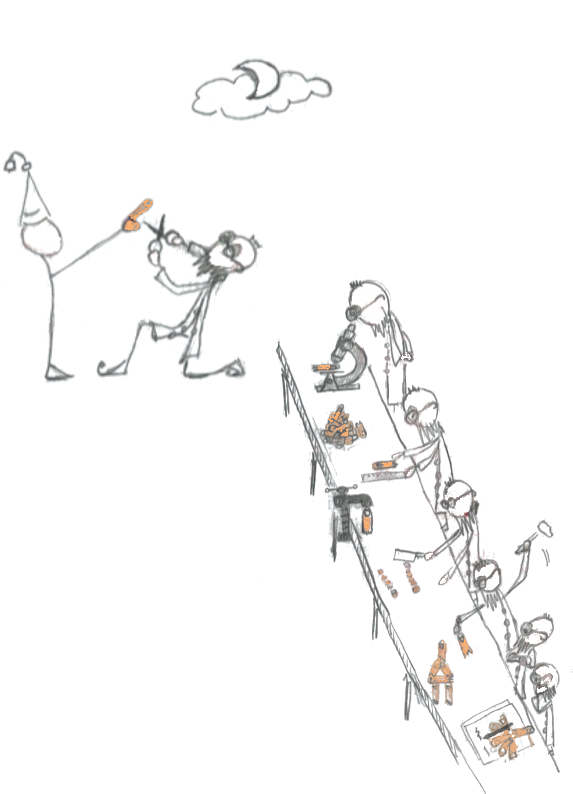
-
Science is not a way to occupy spotty nerdsSpeaking of nerds, we owe to their fantasies a great alternative way of resetting collective unconscious about science: knowing that everything The Big Bang Theory suggests about science is a lie. A couple of episodes of the show is enough to expose you to a rather extensive and vastly redundant enumeration of the most common misconceptions about science readily on their way to very soon be as out-dated as the jokes about women and gays in Friends. (thank you netflix for enabling orgies of TV shows: they are making us quick at snapping out of the cliches they convey). Another thing you can do with The Big Bang Theory is watch it as a documentary about academics. Just diligently replace in your head all instances you hear of the words "science", "scientist", "scientific" etc respectively by the words "academia", "academist", "academic" etc. More.
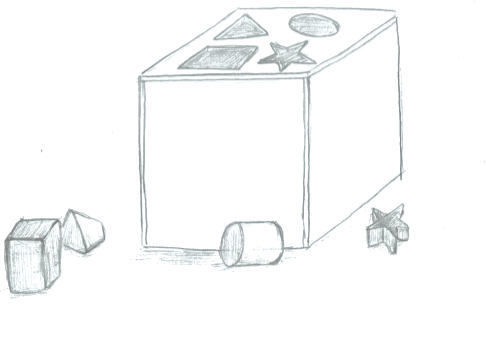 Sudoku-Science is not science. Science is a service. It only considers things insofar as they can be useful = informative = able to make humans see something different(ly) so they might be able to do something different(ly).
Sudoku-Science is not science. Science is a service. It only considers things insofar as they can be useful = informative = able to make humans see something different(ly) so they might be able to do something different(ly).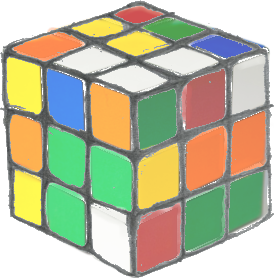 Research has no more reason to be a service to society than say arcade dancing, not unless the people doing it deliberately intend it to be one.
Research has no more reason to be a service to society than say arcade dancing, not unless the people doing it deliberately intend it to be one. -
Science is not made for the sake of it. It’s not a psychological solution but a sensible/sensuous reflex/urge/appetite/compulsion. (that of conforming for a while i.e. building something together out of a shared vision)

-
Science is not sophisticated. It’s informative: it gives form to sense. It captures sense minimalistically into symbols. It finds and expresses the common human intelligible denominator. This is the opposite of building intricate epistemic structures that hold themselves together. Science is neither intricate nor epistemic/intellectual. And intricate intellectual constructs can be made out of just about anything by just about anyone. We don’t need trained scientists for that.There is no value per se in the ability of an intellectual construct to hold itself together (for a house, there is because people live in it, but no-one is meant to live in science). For science there is value in giving actionable form to sense.Science is actionable / operative /workable / practicable/ actual(isable) – not in the sense that it produces new telephones, smart dishwashers and postits with exactly the right amount of stickiness. Those are incidental. Science is actionable as opposed to epistemic /intellectual /sophisticated – actionable in the sense of informative, informative in the sense that it consistently gives us formal grips on inconsistent perspectives / makes us see different things or see things differently.
- Hard science is not hard.
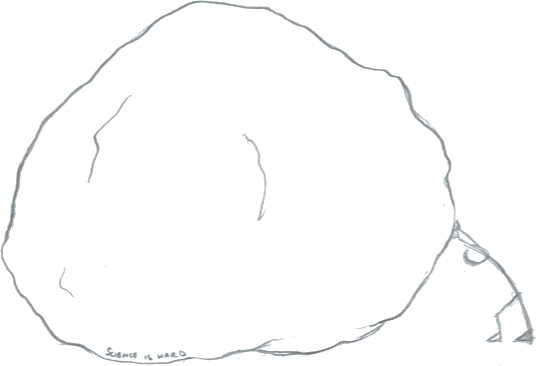
-
Science is sensitive. It’s made by humans for humans out of interest and care for the world they come from.
-
Science is not made to satisfy the curiosity of
researchershuman kind. Many people don’t give a shit about what’s on Mars and they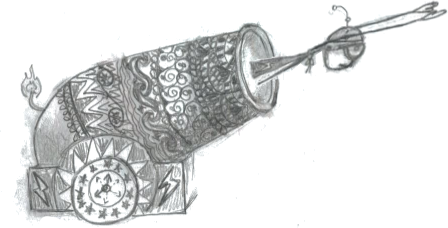 totally are allowed to. As a scientist who believes science is necessarily humane, I also believe it is a human right to not give a shit about what non-scientists call “scientific facts”. They should not be bullied into it.
totally are allowed to. As a scientist who believes science is necessarily humane, I also believe it is a human right to not give a shit about what non-scientists call “scientific facts”. They should not be bullied into it. 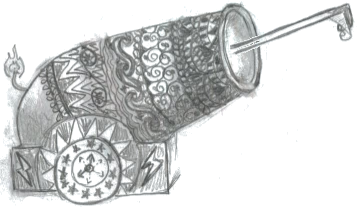 Researchers and other nerdsSpeaking of nerds, we owe to their fantasies a great alternative way of resetting collective unconscious about science: knowing that everything The Big Bang Theory suggests about science is a lie. A couple of episodes of the show is enough to expose you to a rather extensive and vastly redundant enumeration of the most common misconceptions about science readily on their way to very soon be as out-dated as the jokes about women and gays in Friends. (thank you netflix for enabling orgies of TV shows: they are making us quick at snapping out of the cliches they convey). Another thing you can do with The Big Bang Theory is watch it as a documentary about academics. Just diligently replace in your head all instances you hear of the words "science", "scientist", "scientific" etc respectively by the words "academia", "academist", "academic" etc. More might sometimes feel they have the authority to, but no scientist ever does.
Researchers and other nerdsSpeaking of nerds, we owe to their fantasies a great alternative way of resetting collective unconscious about science: knowing that everything The Big Bang Theory suggests about science is a lie. A couple of episodes of the show is enough to expose you to a rather extensive and vastly redundant enumeration of the most common misconceptions about science readily on their way to very soon be as out-dated as the jokes about women and gays in Friends. (thank you netflix for enabling orgies of TV shows: they are making us quick at snapping out of the cliches they convey). Another thing you can do with The Big Bang Theory is watch it as a documentary about academics. Just diligently replace in your head all instances you hear of the words "science", "scientist", "scientific" etc respectively by the words "academia", "academist", "academic" etc. More might sometimes feel they have the authority to, but no scientist ever does. -
Science doesn’t accumulate knowledge. It updates understanding. You don’t need science to hoard knowledge and facts, especially not nowadays.

-
Science is not technology. Those are two different things that you can’t being doing at once. They are mutually exclusive. To make technology you have to put to use Trophey-science, that is, the history of science. Science is present. Technology is incidental to science. Science is actionable. Designing a new model i.e. formalising a new perspective, i.e. producing a new piece of information is enough. Turing Machines made of bits of plastic and metal are side-effects of the historical scientific concepts of electricity and computation.
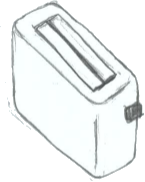
– – – more : – – – Things like new telephones, smart dishwashers and postit stickiness come into existence not because scientists happen to have the ability to make them and because we must give scientists something to do. Rather, they come into existence as a response to how we humans are presently collectively experiencing and envisioning the world. The primary reason for GPS’s not to have existed in the Middle Ages, is not want of the state of technological advancement needed to produce GPS’s, obviously, otherwise humans would have been deliberately working to get to that state as soon as the Middle Ages. I don’t think they were. I think none of the things they were deliberately doing had deliberately anything to do with GPS’s.
-
Researchers are not finders. (whether it be finders of truth, of answers, or of explanations) Or else as a scientist, I don’t want to be one.
-
Science is not something you should agree with.
-
Science is not a view of the world. It’s the cultivating of grounds on which people’s minds can locally meet, deliberately explore alternative views and impact on the world according to a common momentary vision. So really, nothing to do with a world view.
– more: – – Science is not trying to change people and replace their world views so that everybody agrees on the same one. People change if they want to change. Either way it’s fine by science. Science doesn’t need people to be any particular way. Science will happen anyway. Science values humans’ present state of mind without caring to entertain or replace it. The question science is addressing is not How to replace or entertain the way we think, but rather Where can we go from here together, in a way that makes common sense to us all?
What science can do for us isn’t to support or replace our views, but to expose the paths we can take starting from where we are now. The rest is up to us.
-
Science is not made by the aged. Although academia probably is.

- Science is not safe.
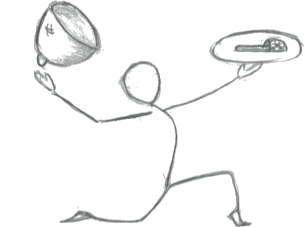
-
Science runs on magic. The formal tends to inform on the formalised (the whole of science counts on that).
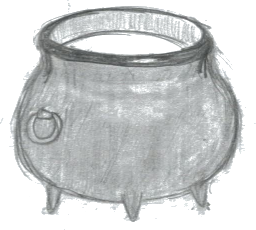
-
Interdisciplinarity is not a scientific discipline. It’s just an academic one.
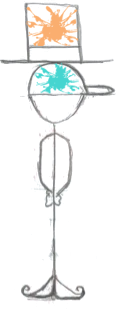 Other academic disciplines are not scientific either, they’re just academic, i.e. mostly administrative.
Other academic disciplines are not scientific either, they’re just academic, i.e. mostly administrative.
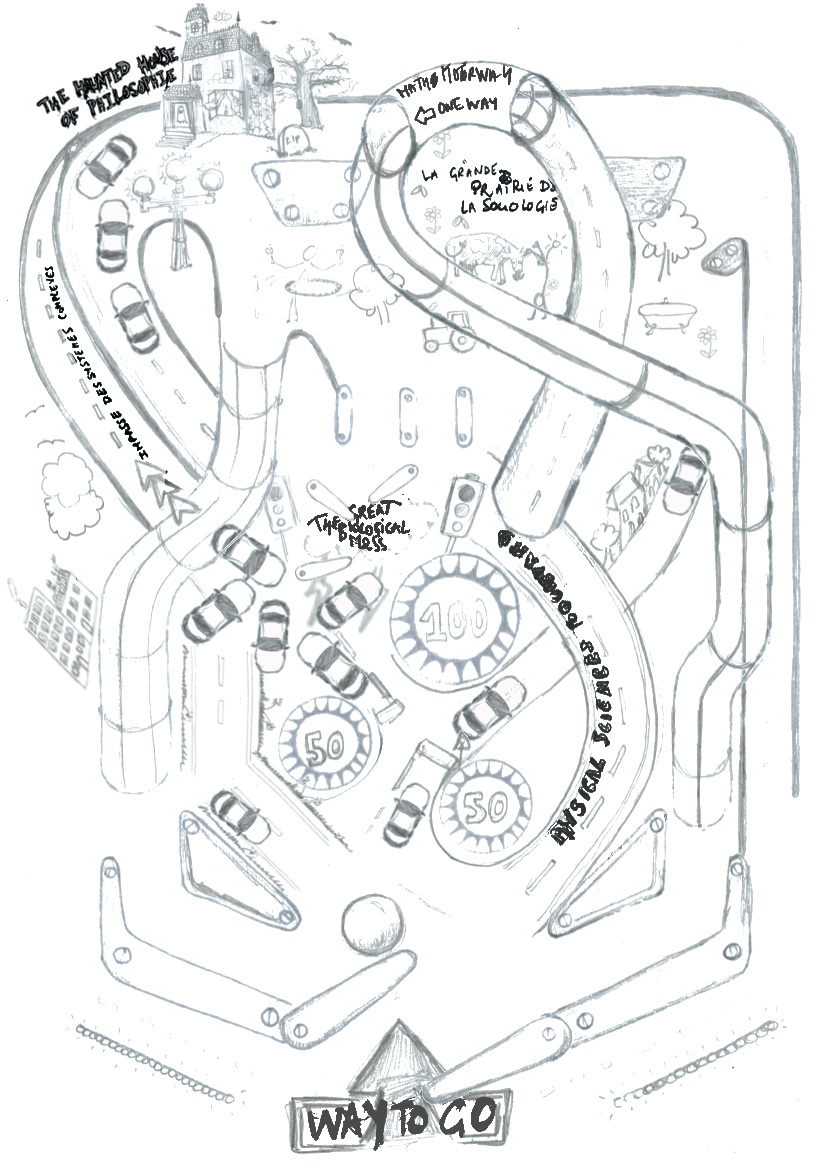
-
Next statement relates to an academic researcher’s worst nightmare …
 … but I’m not sure you’re ready for it yet …
… but I’m not sure you’re ready for it yet …to-do: remind difference between the formalisation, the model per se and the underlying theory. mention the risks of refining models & of disregarding what it is a model allows and disallows to say, and things we might not be aware of that the underlying theory says as a consequence of things we initially put in there.